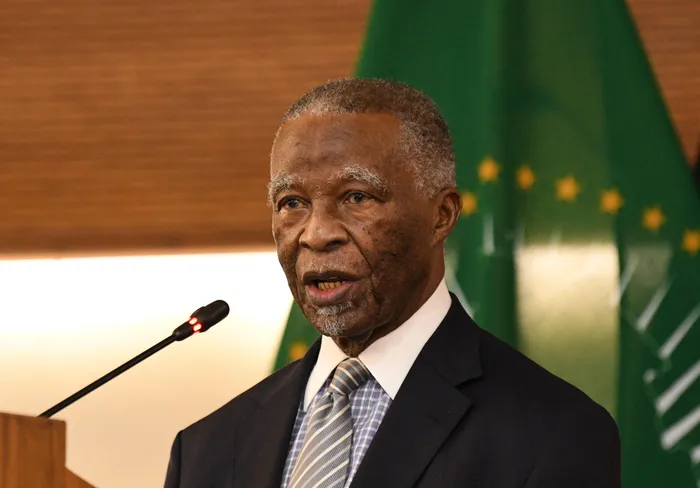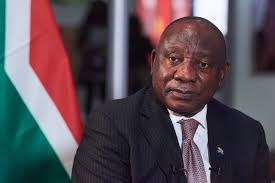Echoes of Unity: Thabo Mbeki’s plea against scapegoating in a fractured Africa

Former South African president, Thabo Mbeki. Photo Credit- Powerhouse Africa
Former South African President Thabo Mbeki stood before an audience marking 15 years of his foundation’s quiet diplomacy, his voice laced with a rare vulnerability. “When I see things like Operation Dudula, it hurts,” he confessed, the words hanging heavy in the air like a storm cloud over the City of Gold. It was Saturday evening at a modest venue in the heart of Johannesburg, where the Thabo Mbeki Foundation celebrated its milestone amid South Africa’s simmering tensions. Operation Dudula, the vigilante group turned political party, has stormed public clinics and schools in Gauteng, demanding checks on foreign nationals’ legal status and railing against what they call an invasion stealing jobs and resources. Mbeki, ever the statesman, saw not just a local flare-up but a fracture in the African dream he helped forge during his presidency.
The roots of Mbeki’s pain trace back to a continent he views not as a patchwork of borders, but as a single, wounded body. Operation Dudula’s raids, echoed by similar patrols from the March and March Movement in KwaZulu-Natal, have polarized communities, with supporters cheering the pushback against undocumented migrants and critics decrying the cruelty of turning away the desperate at hospital doors. Mbeki, drawing from decades of navigating post-apartheid reconciliation, rejected this narrative outright. “We can’t position ourselves as though we’re enemies of other Africans,” he urged, his tone a blend of elder’s wisdom and father’s reproach. In his eyes, these actions don’t just harm the vulnerable; they erode the very solidarity that saw South Africa emerge from isolation into the African Renaissance. As he spoke, one could almost hear the ghosts of liberation struggles whispering warnings against new divisions.
Yet Mbeki’s reflections stretched far beyond Johannesburg’s streets, weaving a tapestry of continental anguish that demands South Africa’s unflinching gaze. Just three weeks prior, his foundation had hosted Congolese envoys pleading for intervention in their nation’s eastern conflicts. “They said that when people outside the Congo look at their country, they see conflict in the east, which is true,” Mbeki recounted, mimicking their earnest plea. “But they said there are problems elsewhere too, and that to address them, they need a national dialogue among Congolese to come together and decide what to do. They said, ‘now, President Mbeki, do something about that.’ They were not requesting; they were insisting.” The foundation heeded the call, stepping into the fray with plans for dialogue. And Sudan? “Terrible things happening both north and south, with no solution in sight,” he lamented, as delegations from across Africa knock on his door, seeking the mediation magic that once defined his era.
At its core, Mbeki’s message was a mirror held up to South Africa: look inward, not outward, for the roots of our woes. “It’s not right. There are problems, we have got to solve in this country, and we can’t say those problems are caused by people who have migrated to South Africa,” he declared, his words slicing through the easy blame game. “We have caused problems … But I’m saying that’s where we come from.” This self-reckoning, he argued, is the true path to healing, acknowledging homegrown failures in governance, inequality, and opportunity before pointing fingers at brothers and sisters crossing borders in search of survival. In a nation still grappling with the scars of xenophobic violence, Mbeki’s stance feels like a balm, reminding us that Africa’s challenges are collective burdens, not imported curses.
As the thanksgiving applause faded, Mbeki left his audience with a clarion call that echoed the foundation’s enduring mission. “The continent has got these huge problems. South Africa has got these huge problems. They need answers,” he said, his eyes alight with the fire of unfinished business. “I think it’s our responsibility; we can’t run away from that.” In the days since, whispers of encouragement have poured in, from Congolese dreamers to Sudanese survivors, affirming the foundation’s role as a beacon in the storm. Mbeki’s words, born of hurt, now pulse with hope: a plea for South Africa to reclaim its place not as a fortress, but as a fulcrum for African renewal. In a world quick to divide, his vision endures, a united front against the real enemies of poverty and strife.




